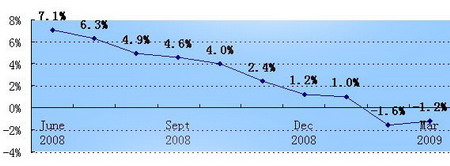
|
BIZCHINA> Economy
 |
|
China's CPI falls 1.2% in March
(Xinhua)
Updated: 2009-04-16 11:18
 China's consumer price index (CPI), a major gauge of inflation, fell 1.2 percent year on year in March, the National Bureau of Statistics (NBS) announced Thursday. This compared with a decline of 1.6 percent in February, the first monthly fall since December 2002. The March CPI decline mainly reflected lower commodity prices and weak demand, Peng Wensheng, analyst with Barclays Capital Research, said in an e-mail statement to Xinhua.
Retail commodity prices fell 0.8 percent in the first quarter, although food prices, which account for about one-third of the CPI, edged up 0.5 percent. The government has set a full-year inflation target of 4 percent. The producer price index, a major measure of inflation at the wholesale level, fell 4.6 percent in the first quarter, the bureau said. The declines in the indices didn't indicate that there was a deflation problem in China, and it wouldn't be necessary to cut interest rates further in the short term, said Wang Xiaoguang, an economist with the National Development and Reform Commission, the country's top economic planner. In an effort to boost economic growth, the People's Bank of China, the central bank, has cut interest rates five times and reduced banks' required reserve ratio four times since September. At the end of last month, the money supply had risen 25.5 percent from a year earlier to 53.06 trillion yuan ($7.77 trillion), while new loans hit a record of 4.58 trillion yuan in the first quarter. Retail sales expanded 15 percent to 2.94 trillion yuan in the first quarter, the NBS said. Zhang Liqun, researcher with the Development Research Center of the State Council, or Cabinet, said the growth in retail sales was "not bad" and showed that the government's policies to boost domestic demand were starting to take effect. Consumption would show stable, relatively fast growth, boosted by rising incomes, said NBS spokesman Li Xiaochao. Urban consumer goods sales rose 14.1 percent to 1.98 trillion yuan, while sales in rural areas increased 17 percent to 956.4 billion yuan.
(For more biz stories, please visit Industries)
|
|||||